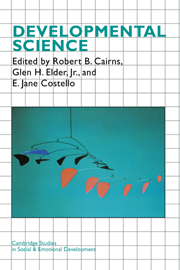Book contents
- Frontmatter
- Contents
- List of Contributors
- Foreword
- Acknowledgments
- Developmental Science:A Collaborative Statement
- 2 Developmental Science: Toward a Unified Framework
- 3 Human Lives in Changing Societies: Life Course and Developmental Insights
- 4 Developmental Psychobiological Theory
- 5 The Question of Continuity and Change in Development
- 6 Primates and Persons: A Comparative Developmental Understanding of Social Organization
- 7 Cognitive Development
- 8 Early Social-Communicative Development: Illustrative Developmental Analyses
- 9 Developmental Psychopathology
- 10 Culture and Cognition in Developmental Perspective
- 11 The Making of Developmental Science
- References
- Author Index
- Subject Index
2 - Developmental Science: Toward a Unified Framework
Published online by Cambridge University Press: 09 November 2009
- Frontmatter
- Contents
- List of Contributors
- Foreword
- Acknowledgments
- Developmental Science:A Collaborative Statement
- 2 Developmental Science: Toward a Unified Framework
- 3 Human Lives in Changing Societies: Life Course and Developmental Insights
- 4 Developmental Psychobiological Theory
- 5 The Question of Continuity and Change in Development
- 6 Primates and Persons: A Comparative Developmental Understanding of Social Organization
- 7 Cognitive Development
- 8 Early Social-Communicative Development: Illustrative Developmental Analyses
- 9 Developmental Psychopathology
- 10 Culture and Cognition in Developmental Perspective
- 11 The Making of Developmental Science
- References
- Author Index
- Subject Index
Summary
A fresh synthesis of ideas and findings has recently emerged across the several areas of developmental investigation. As indicated in Chapter 1, this synthesis employs concepts that have issued from longitudinal investigations, life-course studies of contextual change, cognitive development, and developmental psychobiology. Consistent with the collaborative statement, the stuff of development is seen as arising from the dynamic interrelations among systems that exist within and without persons. A nuclear principle of this holistic framework of development is that “the individual is an active, purposeful part of an integrated, complex and dynamic personenvironment system. A consequence of this view is that it is not possible to understand how social systems function without knowledge of individual functioning, and it is not possible to understand individual functioning and development without knowledge of the environment” (Magnusson & Stattin, in press). Accordingly, development is not simply a property of individuals – social interactions develop, communities change, and societies evolve. In this chapter, we summarize some principles that provide a bridge between the conceptual framework of developmental science and the concrete methods required for the conduct of developmental research.
In the consensus statement in Chapter 1, we observed that “recognizing the complexity of development is the first step toward understanding its coherence and simplicity”. The problem has been that it has been difficult for researchers to move beyond the first step. Accordingly, the holistic perspective described in the collaborative statement presupposes multidisciplinary methods and multilevel measures.
- Type
- Chapter
- Information
- Developmental Science , pp. 7 - 30Publisher: Cambridge University PressPrint publication year: 1996
- 148
- Cited by

